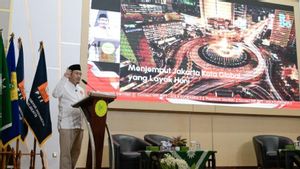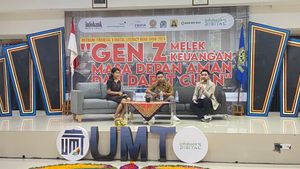JAKARTA - Deputy Minister of Finance II Thomas Djiwandono emphasized that digitalization is not just an option, but an absolute need for Indonesia to encourage inclusive and sustainable economic growth.
According to Thomas, digitalization has the power to accelerate economic and social transformation, especially in the midst of increasingly complex global challenges.
In addition, Thomas also highlighted the importance of digitizing roles in opening new market access, expanding economic opportunities, and empowering the community.
"Digitalization provides opportunities for many people to improve their skills and capacity," Thomas said in his statement, Wednesday, October 2.
Thomas conveyed the important role of digitalization in empowering SMEs and women, as well as creating more job opportunities in the creative economy sector, because digitization not only helps people access new markets, but also reduces costs and expands opportunities.
Meanwhile, Indonesia is supported by more than 270 million people and the majority are already digitalizing, according to Thomas, this makes Indonesia ready to lead digital transformation in Asia.
Thomas also emphasized that with the Omnibus Law of the Financial Sector as a strong legal basis, the government ensures that Indonesia is ready to face the digital era with proactive policies.
"This law strengthens the legal basis for digital finance, including digital currencies, digital banks, financial technology, and digital financial assets such as crypto assets," explained the Deputy Minister of Finance.
In addition, Thomas emphasized that the government also strengthens financial consumer protection, increases financial literacy, and strengthens regulations and supervision of digital financial assets, through the implementation of this law.
"Over the last decade, the Ministry of Finance has started reforms in the digital transformation of state finances and bureaucracy," he said.
BACA JUGA:
Thomas said that this transformation aims to increase efficiency, transparency, and accountability in the management of state finances and improve the quality of public services.
Therefore, Thomas emphasized the importance of cross-border collaboration and institutions to ensure equitable economic growth in this digital era.
"Together, we can build supporting digital skills, infrastructure, and regulatory frameworks to encourage our respective economies going forward and ensure sustainable and equitable growth for all," he concluded.
The English, Chinese, Japanese, Arabic, and French versions are automatically generated by the AI. So there may still be inaccuracies in translating, please always see Indonesian as our main language. (system supported by DigitalSiber.id)
















